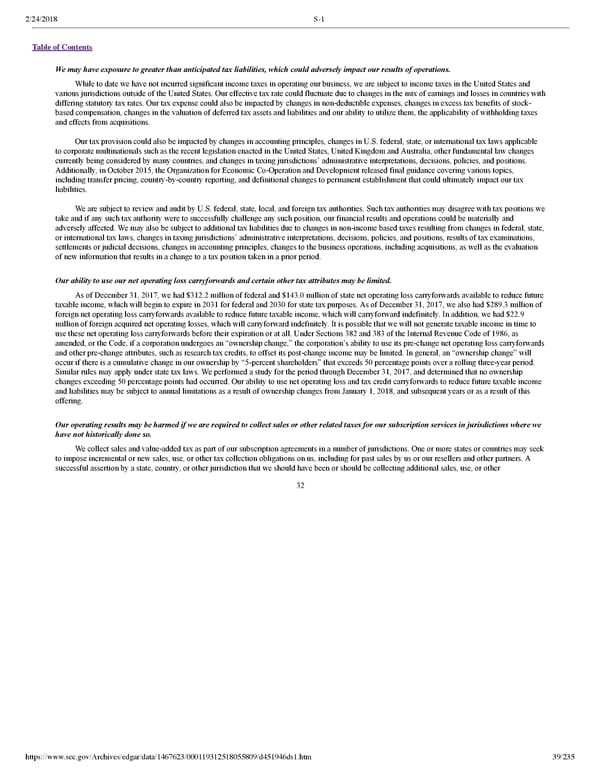2/24/2018 S-1 Table of Contents We may have exposure to greater than anticipated tax liabilities, which could adversely impact our results of operations. While to date we have not incurred significant income taxes in operating our business, we are subject to income taxes in the United States and various jurisdictions outside of the United States. Our effective tax rate could fluctuate due to changes in the mix of earnings and losses in countries with differing statutory tax rates. Our tax expense could also be impacted by changes in nondeductible expenses, changes in excess tax benefits of stock based compensation, changes in the valuation of deferred tax assets and liabilities and our ability to utilize them, the applicability of withholding taxes and effects from acquisitions. Our tax provision could also be impacted by changes in accounting principles, changes in U.S. federal, state, or international tax laws applicable to corporate multinationals such as the recent legislation enacted in the United States, United Kingdom and Australia, other fundamental law changes currently being considered by many countries, and changes in taxing jurisdictions’ administrative interpretations, decisions, policies, and positions. Additionally, in October 2015, the Organization for Economic CoOperation and Development released final guidance covering various topics, including transfer pricing, countrybycountry reporting, and definitional changes to permanent establishment that could ultimately impact our tax liabilities. We are subject to review and audit by U.S. federal, state, local, and foreign tax authorities. Such tax authorities may disagree with tax positions we take and if any such tax authority were to successfully challenge any such position, our financial results and operations could be materially and adversely affected. We may also be subject to additional tax liabilities due to changes in nonincome based taxes resulting from changes in federal, state, or international tax laws, changes in taxing jurisdictions’ administrative interpretations, decisions, policies, and positions, results of tax examinations, settlements or judicial decisions, changes in accounting principles, changes to the business operations, including acquisitions, as well as the evaluation of new information that results in a change to a tax position taken in a prior period. Our ability to use our net operating loss carryforwards and certain other tax attributes may be limited. As of December 31, 2017, we had $312.2 million of federal and $143.0 million of state net operating loss carryforwards available to reduce future taxable income, which will begin to expire in 2031 for federal and 2030 for state tax purposes. As of December 31, 2017, we also had $289.3 million of foreign net operating loss carryforwards available to reduce future taxable income, which will carryforward indefinitely. In addition, we had $22.9 million of foreign acquired net operating losses, which will carryforward indefinitely. It is possible that we will not generate taxable income in time to use these net operating loss carryforwards before their expiration or at all. Under Sections 382 and 383 of the Internal Revenue Code of 1986, as amended, or the Code, if a corporation undergoes an “ownership change,” the corporation’s ability to use its prechange net operating loss carryforwards and other prechange attributes, such as research tax credits, to offset its postchange income may be limited. In general, an “ownership change” will occur if there is a cumulative change in our ownership by “5percent shareholders” that exceeds 50 percentage points over a rolling threeyear period. Similar rules may apply under state tax laws. We performed a study for the period through December 31, 2017, and determined that no ownership changes exceeding 50 percentage points had occurred. Our ability to use net operating loss and tax credit carryforwards to reduce future taxable income and liabilities may be subject to annual limitations as a result of ownership changes from January 1, 2018, and subsequent years or as a result of this offering. Our operating results may be harmed if we are required to collect sales or other related taxes for our subscription services in jurisdictions where we have not historically done so. We collect sales and valueadded tax as part of our subscription agreements in a number of jurisdictions. One or more states or countries may seek to impose incremental or new sales, use, or other tax collection obligations on us, including for past sales by us or our resellers and other partners. A successful assertion by a state, country, or other jurisdiction that we should have been or should be collecting additional sales, use, or other 32 https://www.sec.gov/Archives/edgar/data/1467623/000119312518055809/d451946ds1.htm 39/235
 Dropbox S-1 | Interactive Prospectus Page 38 Page 40
Dropbox S-1 | Interactive Prospectus Page 38 Page 40